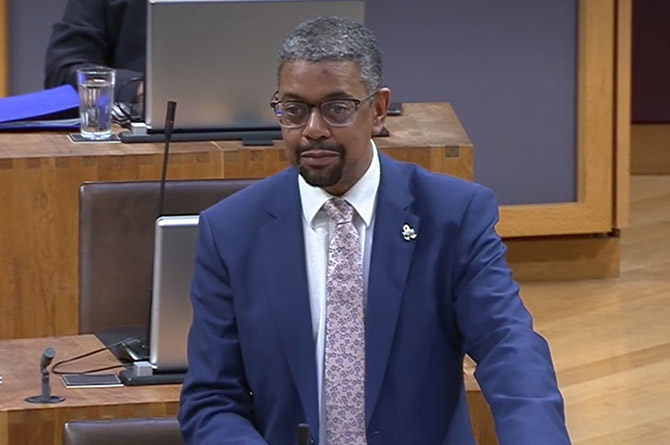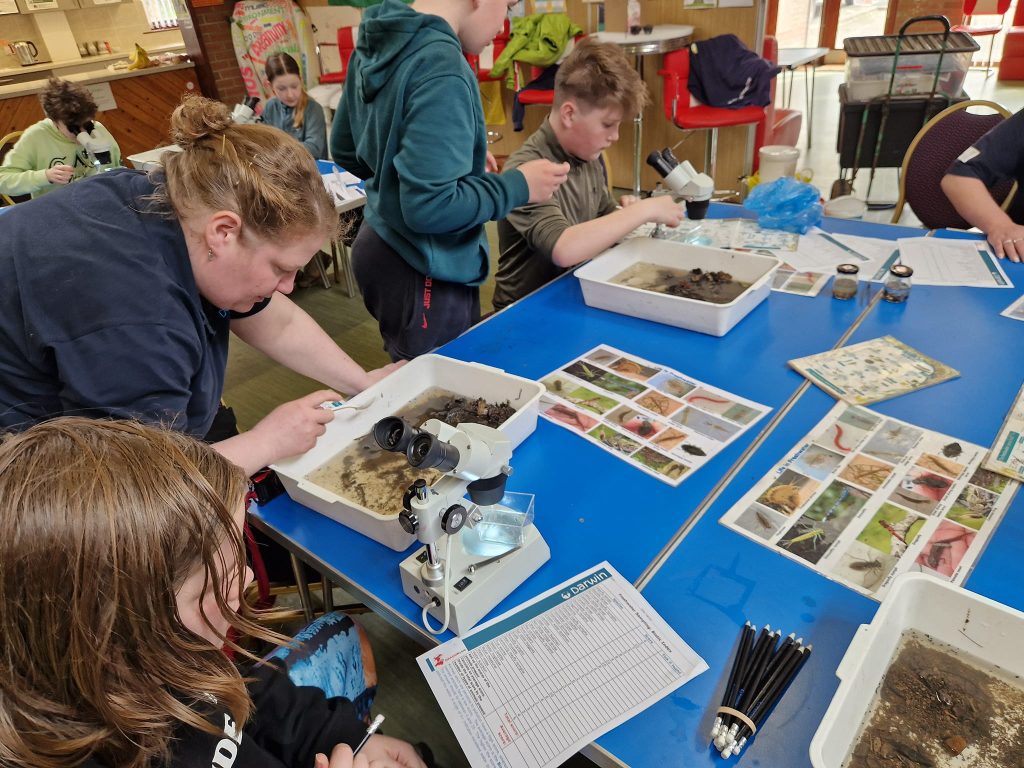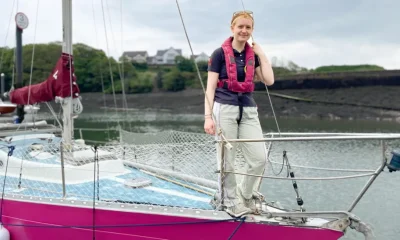Education
Vaughan Gething that says too many children are in care

TOO MANY children are being taken from their families, the First Minister admitted, with more than one child in every 100 in Wales now living in care.
Vaughan Gething also warned far too many children and young people do not have a good experience of the care system as he gave evidence to a Senedd scrutiny committee.
John Griffiths raised concerns about an 83% increase in the number of children in care over the past two decades between 2003 and 2022.
The Labour MS for Newport East warned care rates are significantly higher than in England, with “massive, unexplained” variation within Wales.
Mr Gething said: “The picture is still broadly one where too many children are taken into care,” adding that “some people get decent outcomes” but “far too many don’t.”
The First Minister stressed that solving the problem is not as straightforward as the Welsh Government declaring “you cannot take children into the care system”.
Pressed about how he will reverse the trend, Mr Gething said the aim is not only to reduce numbers but to work with, and for, looked-after children to deliver better outcomes.
Alistair Davey, the Welsh Government’s deputy director of social services, told committee members that 25% of children in care are placed outside their home county.
Jenny Rathbone, the Labour MS for Cardiff Central, criticised the pace of change, raising concerns about “constant slippage” in the Welsh Government meeting milestones.
Warning that Wales is an outlier, with the high number of children in care an endemic problem, Ms Rathbone said councils are facing “huge” costs and potential bankruptcy.
“We haven’t got time on our side and children’s lives are being affected,” she stressed.
Urged to get a grip, Mr Gething acknowledged the need for urgency but cautioned that there is not a switch to flick that will change outcomes for children and young people.
Mr Griffiths also raised concerns about educational outcomes for looked-after children, with only 17% getting five GCSEs at ‘C’ or above compared with 54% for pupils generally.
James Evans, the Tory MS for Brecon and Radnorshire, highlighted that looked-after children face significant additional challenges such as moving just before exams.
Recognising that such disruption has a very real impact, Mr Gething said GCSE results for looked-after children reflect the challenges in their lives rather than their ability.
He was not convinced about the need for a specific strategy, echoing Carwyn Jones’ concerns about the Welsh Government becoming a “strategy factory”.
Ms Rathbone pressed the First Minister about concerns the Welsh Government’s “woolly” child poverty strategy lacks ambition and focuses too much on levers outside its control.
She said the children’s commissioner, Audit Wales, the Bevan Foundation and many others are among a chorus calling for clear targets on reducing child poverty.
Mr Gething stressed that poverty will be a key priority for his government, which will refocus on investing in the first 1,000 days of a child’s life.
He said delivering the objectives of the child poverty strategy would make a radical difference to the lives of children and young people.
Warning that the private sector does not deliver the right quality of care and outcomes, the First Minister set out plans to remove profit from the care of looked-after children.
He explained that Dawn Bowden, the newly-appointed social care minister, will bring forward a bill in the week beginning May 20 before the Senedd’s Whitsun recess.
Mark Isherwood, who represents North Wales, stressed that there is no guarantee a non-profit model will prevent money leaving the sector.
The Conservative warned public sector provision could ultimately cost more and deliver less.
Mr Gething said the reforms are not simply about profit motive, but delivering improved outcomes and making better use of the money.
Warning of a crisis in the social care workforce, James Evans raised concerns about an over-reliance on agency staff with high costs “crippling” councils.
The former councillor said social workers face unmanageable workloads, with as many as 40 cases at a time, as he called for a legal maximum on the number of cases.
Mr Gething rejected the suggestion, saying: “What do you do if you reach a limit and you are not legally allowed to take on any extra work if you have another child who needs support?
“Do you say ‘the inn is full, take your luck in the stable’ or do you say ‘actually, we’ve got to find a way to try to manage with the resources we’ve got’?”
Labour’s Jack Sargeant focused on corporate parenting, warning that more than 25% of children moved care placements twice or more in the year to March.
Mr Sargeant, who represents Alyn and Deeside, backed the “bold and brave” decision to proceed with a basic income pilot for care leavers and asked if it could be extended.
Mr Gething would not give a hard-and-fast commitment, saying an evaluation of the project by Cardiff University will report in 2027 which is beyond the next Senedd election.
However, the First Minister told MSs he would be surprised if Labour was not interested in taking the pilot forward with a manifesto commitment in 2026.
“I certainly hope the evidence allows us to do that,” he told the meeting on April 26.
Asked where care-experienced children sit on his list of priorities, Mr Gething stressed that the government’s commitment to a radical reform summit’s declaration is undimmed.
Education
Senedd told of families’ struggles with new ALN system

FAR TOO many children and young people are unable to access support under Wales’ new additional learning needs system, leaving families at breaking point, the Senedd heard.
Jack Sargeant led a debate on a 15,000-name petition, submitted by Victoria Lightbown, raising concerns about implementation of the additional learning needs (ALN) system.
He said the ALN reforms have triggered more petitions in recent months than any other subject aside from 20mph, with five being considered by the petitions committee.
Mr Sargeant raised Estyn’s concerns about inconsistent application of reforms under the ALN Act, which is replacing the previous special educational needs (SEN) system.
The Labour MS, who chairs the petitions committee, said he has heard harrowing stories of parents having to fight against a system that sometimes feels inflexible and unsympathetic.
Buffy Williams, the newly elected chair of the Senedd’s education committee, said there is enthusiasm for the reform’s core principles but too much inconsistency on the ground.
She cautioned that a new category of pupils, with lower level additional needs, is emerging.
“They were on schools’ old SEN registers,” said the Labour backbencher.
“But for various reasons – which include funding, workload and perhaps the flexibility offered by the new curriculum – they are not being recognised as having ALN.”
Ms Williams, who represents Rhondda, said 32% fewer children were recorded as having SEN or ALN in the 2022/23 school year compared with 2020/21.
She raised concerns from the president of the education tribunal about “universal provision” being wrongly used as a reason not to give a child an individual development plan.
Saying the Act needs time to bed in, Ms Williams added that schools’ ALN co-ordinators need more dedicated non-teaching time to do their roles justice.
Sam Rowlands, for the Conservatives, raised concerns about far too many children falling through the gaps amid a massive overhaul of the system.
Mr Rowlands, the former Conwy Council leader, who represents North Wales in the Senedd, said parents also report issues with accountability.
Heledd Fychan, Plaid Cymru’s shadow education secretary, warned that too many children and young people are unable to access the support they need.
She told the chamber she was moved to tears by stories of families at breaking point.
Ms Fychan recalled one parent telling her how they contemplated suicide due to the strain of constantly trying to fight for the support their child deserves.
“This is the level of concern in our community – support is desperately needed,” she said.
The South Wales Central MS raised concerns about “incredible” inconsistencies for learners who need additional support in Welsh.
She warned that disabled and neurodivergent children are being excluded from many of the things that make school fun, from school trips to Christmas concerts.
Peredur Owen Griffiths, her Plaid Cymru colleague, highlighted a sense of frustration and anger among parents stemming from dismay at substandard provision.
He quoted a letter from Blaenau Gwent Council to parents which warned schools “can no longer afford to recruit the required number of staff to support our most vulnerable learners”.
Hefin David, whose daughter is autistic, reflected on his own family’s experiences.
He said: “One of the things that happens when you have a child with additional learning needs, or ALN in your family, is that it isn’t a moment of revelation – it’s a slow discovery.”
The Labour MS for Caerphilly stressed the importance of educational and clinical support, warning that all too often the two are disconnected.
Dr David likened the system to a pinball machine that passes parents from pillar to post.
He said his daughter is clearly diagnosable and in the right place in the system, but: “The problem you’ve got is where the children have more grey-area diagnoses….
“It’s much harder for them to find their place in the system as well, and I know others have had that experience. That’s where we really need to pick up.”
Vikki Howells, a fellow Labour backbencher, stressed that the transition to the new ALN system is not yet complete, with phased implementation allowing lessons to be learned.
She said casework in her Cynon Valley constituency shows ALN must be a priority.
Ms Howells, a former teacher and assistant head of sixth form at Caerphilly’s St Cenydd Comprehensive, highlighted a Welsh Government announcement of a further £20m for ALN.
Mabon ap Gwynfor, the Plaid Cymru MS for Dwyfor Meirionnydd, called for educational support to be based more on need rather than a diagnosis.
The shadow health secretary raised examples of children aged six not getting a diagnosis until they are 12 or 13, leading to a delay in support at school.
Lynne Neagle, Wales’ new education secretary, said ALN reform was always going to be an ambitious, systemic programme of change and it remains early days.
Vowing action to improve implementation, she told the chamber her priorities are twofold: improving oversight and increasing consistency.
Responding to the debate on May 8, she said the Welsh Government has protected more than £50m this year for ALN reforms.
Ms Neagle said there are examples of excellent practice in Wales’ schools, with the sector embedding a new person-centred approach while running the SEN system in parallel.
But she recognised the challenges, telling MSs: “We do hear too often that the families of children with ALN have to fight for the right support and education – and this must change.”
Education
Young people dive into My River project to learn about Cleddau

DURING the Easter Holidays, young people from The Edge Youth Centre and the Army Welfare Service took part in a two-day environmental project in Haverfordwest in partnership with the Cleddau Project.
The ‘My River’ project enabled young people to connect with the River Cleddau, learn about the importance of looking after rivers and discuss what their river means to them as young people.
At the start of the project, the young people linked up with the West Wales Rivers Trust for the Big River Clean Up in Haverfordwest.

The young people helped clean up a stretch of the Western Cleddau River that runs alongside Bridge Meadow Park and Morrisons.
In the afternoon, they enjoyed an engaging session delivered by the Darwin Centre looking at the mini-beasts that live in our rivers under microscopes.
On day two the young people reflected on their findings creating a story with illustrator Fran Evans.
The young people created a piece of art telling the story of their river and the importance of looking after the river.

The story is called the ‘adventures of the trash trio’ and will be exhibited to the public at the ‘My River’ Art Exhibition at HaverHub, Quay Street, Haverfordwest at the end of June.
The young people will be coming back together in May Half-Term to explore the river in Haverfordwest by canoeing up the Western River Cleddau.
Steve Lewis, Senior Youth Worker said: “This project educated young people on the importance of our rivers and how they support wildlife, ecosystems and recreation activities. It was fantastic to see the enthusiasm from the young people and to see them connecting with their river.”
This project has been made possible by funding from the UK Government through the UK Shared Prosperity Fund.
Education
ESTYN inspectors praise ‘happy and friendly’ Ysgol Casblaidd

YSGOL Casblaidd has been described as a “happy and friendly community’ by inspectors.
Estyn, the education and training inspectorate for Wales, visited Ysgol Casblaidd in Wolfscastle in February, and has released its findings following a full inspection of the school.
The report noted:
- The school has a strong culture of safeguarding pupils.
- Wolfscastle school is a happy and friendly community.
- A strong feature is the school’s relationship with its local community.
- During their time at the school, many pupils, including those with additional learning needs, make sound progress from their starting points.
- Pupils enjoy coming to school and feel very happy within the homely and inclusive environment. This is reflected in the schools high attendance rate.
- Most pupils have very positive attitudes to learning. They enjoy and apply themselves to their tasks with excitement and enthusiasm.
- Staff have very warm relationships with the pupils. They treat them with kindness and respect and this creates an inclusive environment where the happiness, well being and progress of all pupils is a priority.
- The school and staff know their pupils, their families and the local community very well. They place a high priority on pupils’ well being and respond to their emotional and social needs with sensitivity.
- The school has a clear vision based on creating a happy and caring learning environment to provide a firm foundation for pupils to develop their core skills.
- An ethos of working as a productive team among teachers and assistants is a notable element of the school.
- The school’s relationship with parents is a strength and the continuous co-operation and communication promotes the school in its community highly effectively.
- The headteacher leads the school highly effectively and encourages pupils to develop their skills and talents in an inclusive learning environment.
Headteacher, Sasha Edwards, said: “I am delighted with this report. Ysgol Casblaidd is an exceptional school and I am immensely proud to be its Headteacher.
“I would like to commend the outstanding staff and governors who have worked relentlessly to ensure that every pupil is valued and that their wellbeing and progress in their learning is paramount.
“Ysgol Casblaidd is a school that our pupils, families and wider community can be very proud of.”
Chair of the Governing Body, Lisa Thomas, added: “I am extremely proud of the pupils, staff, parents and Governors of Ysgol Casblaidd. It was a pleasure to welcome the inspection team, and I was pleased that they were able to see what is so wonderful about our school – in particular their comments on the politeness of pupils enthusiasm for learning that they have.
“The schools work with the local community was also commented on, and I would like to take this opportunity to thank the community of Wolfscastle for their unwavering support – we can all be extremely proud of this report.”
The full report is available online
-

 Community4 days ago
Community4 days agoTragic passing Josh, 28, mourned by Milford Haven community
-

 Community4 days ago
Community4 days agoLucy’s sudden passing at just 38 leaves a community in mourning
-

 Community6 days ago
Community6 days agoJoy as Willow rescued by coastguard after 12-day ordeal
-

 News22 hours ago
News22 hours agoAurora Alert: Another chance to see the Northern Lights tonight
-

 Crime4 days ago
Crime4 days agoDrunk digger driver remanded for hurling racial abuse at neighbours
-

 Business7 days ago
Business7 days agoDragon LNG explores integration of LNG and CO2 liquefaction processes
-

 Crime5 days ago
Crime5 days agoFarm mechanic admits drink driving after losing control of vehicle
-

 News1 day ago
News1 day agoRenewed social media appeal over Sian Batchelor’s death



























